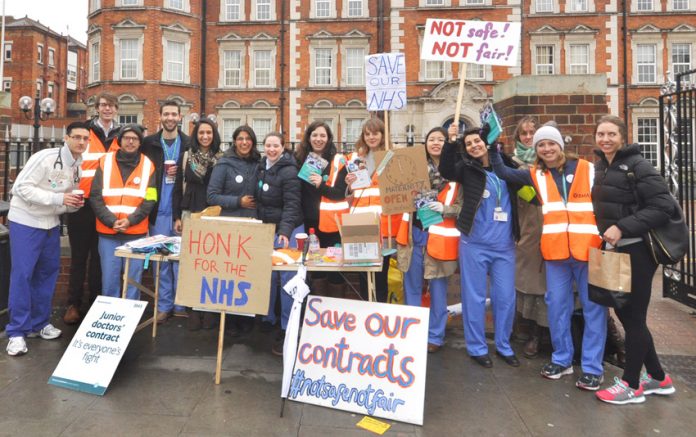
TORY health secretary Jeremy Hunt, after attempting to impose an unsafe and unfair contract on junior doctors, now wants new contracts for one million health workers across the NHS, including consultants.
Hunt says he is in ‘constructive’ negotiations with NHS unions on ‘further contract reform.’ He said the government is keen to achieve changes to contracts for all staff on Agenda for Change contracts as well as hospital consultants.
On the junior doctors struggle, Hunt claimed: ‘It is not the case that I sought out that confrontation or that I am looking for the next big battle to fight.’ However, he then went on to confirm that he was going to push for ‘flexible working’ for all NHS workers. This means that attempts to reduce or remove anti-social hours payments, the red line that the junior doctors struggle was fought over, will now be on the agenda for all NHS workers.
Hunt said: ‘One example is to improve what we do on flexible working. These are things that will keep people in the workforce, stop people feeling they have to become locums or work for agencies and will improve care for patients.’
Meanwhile, nurses’ union RCN has underlined a ‘perfect storm’ which is escalating the staffing crisis in the NHS. An analysis of figures by the RCN shows that half of nurses are aged 45 or over and within 10 years of being eligible for early retirement. Ten years ago just a third of the nursing workforce in England was aged 45 or over.
RCN says that this means that nurses need a pay rise as more and more NHS students are being driven away from going into nursing because of the poor pay, long shifts, understaffed wards and massive funding cuts to the NHS. The research also highlights an unprecedented number of risk factors which will affect the future supply of safe staffing levels.
These include the ageing workforce, rising demand, uncoordinated workforce planning, changes to student nurse funding, real terms cuts to nurse pay and the impact of Brexit on international recruitment. To alleviate the retention crisis, the RCN is calling on the government to scrap the 1% pay cap for NHS staff, warning that unless nurses’ pay reflects the increase in cost of living, trusts will struggle to attract enough staff to provide safe patient care.
RCN Chief Executive & General Secretary Janet Davies said: ‘The trends indicated in this report add up to a perfect storm of risks to the future supply of nursing staff. Many of these risks could have been avoided, and now immediate action is required.
‘The government has largely ignored the crisis facing the nursing workforce. Its only action so far has been to change the way nurse training is funded, introducing loans which mean that future nurses will be expected to take on debts with little prospect of fair pay when they graduate.
‘By making nursing like any other degree, even though a nurse’s salary is £8,000 less than the median graduate salary, the government has made it less appealing and created more uncertainty, not less.’ A petition demanding an end to pay restraint for NHS staff, started by RCN member Danielle Tiplady, has already reached 25,000 signatures.